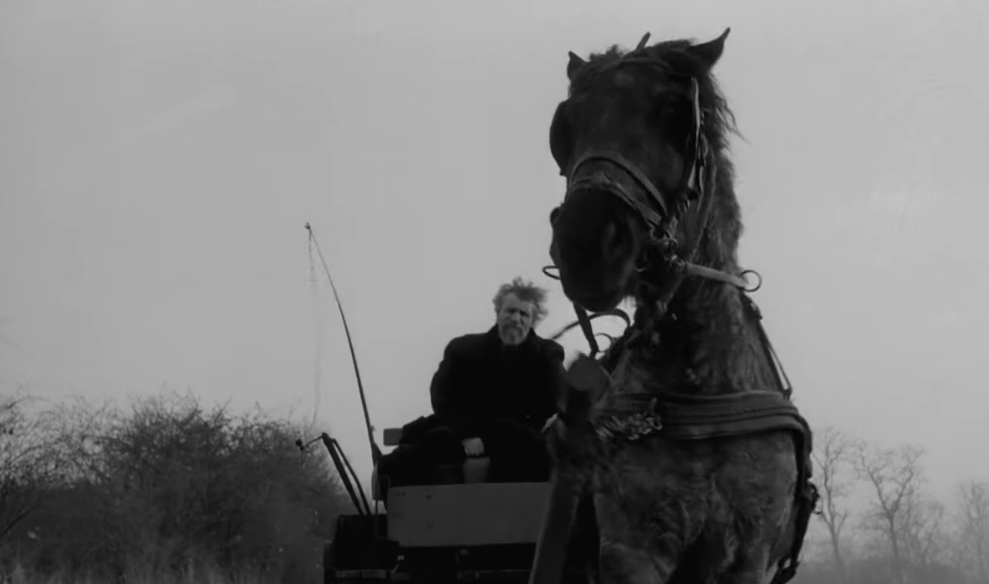It’s a depressing film to think about in these times, but I am constantly thinking about Bela Tarr’s The Turin Horse anyway. Particularly the long conversation about it I had with a friend at a bar. Remember going to bars? Remember being in a crowded place, getting drunk and talking about the things you love to—need to—talk about?
This friend is a melancholy fellow and his belief is that cinema, much as he loves it, eventually degrades into kitsch. I fought back on this because I believe cinema can have cultural and political relevance, and can be transcendent in both of these modes. He stood his ground. Nothing lasts, he said. The only ideology unbound by anything around it is nihilism.
The Turin Horse is unbound in just this way. Depicting the monotonous and moribund existence of a Hungarian farmer, his daughter, and the titular horse that is their sole source of transportation and labor, the film assaults the viewer from the start with a blaring accordion over a closeup of the horse struggling to pull a cart through muck. As each day’s routine presses on, no different from any other day, the horse is continually abused and exploited. Eventually, the horse stops working. It stops eating. It stops everything that makes the wheels turn and the lights go on in the small farm. Tarr’s film is a foreshadowing of the world’s end.
The title of the film refers to an apocryphal incident in the life of Frederic Nietzsche in Torino, Italy. Chris Townsend traced the story’s history in the Los Angeles Review of Books; it appears to have originated in the scene of a horse being beaten in Dostoevsky’s Crime and Punishment.
Raskolnikov, in the voice of a child, pleads with the men to stop. Crying, he runs forward and looks the horse directly in the eye, and in doing so, is caught by a lash from the whip. As the cruelty escalates and the horse collapses, it becomes clear that it will die. Raskolnikov throws his arms around the bloodied muzzle and kisses it around the eyes, calling in vain for the barbarism to stop. His father scoops him up and drags him away from the horse, against his will, and suddenly Raskolnikov awakes, cold and sweating. He understands the significance of the dream, and understands that he himself was at once the child, the flogged horse, and the man with the whip.
The monotony of the farmer and daughter’s lives in The Turin Horse is a deliberate political statement echoing Dostoevsky’s tragic scene. The farmer wakes up, puts clothes on, bathes, his daughter prepares food—boiled potatoes with salt, at every single meal—and they get the horse up to work.
Following the suspension of Bernie Sanders’ campaign, the movement he fostered is being dragged back to the same place where it found itself before the 2016 election. The repetitive nature of established systems and institutions in America calls to mind the unrelenting windstorms that howl around the farm in The Turin Horse. The remorseless reality of life is so ingrained that there’s no indication of a source point and thus, no real indication of where an endpoint might be found. Even following a decision to abandon the farm, the farmer, daughter, and horse return a while later and settle back into their existence amid the storm: the metaphysical, purgatorial Sisyphean state they are doomed to repeat.
Extremely long takes recount days that blend together and follow a routine of little to no change. The molasses-like movement is disrupted only by the insistence that the source of labor, the horse, will cease to exist. When the horse stops eating it is not a matter of protest, it is a matter of understanding that the animal simply cannot go on. A refusal to exist in the face of continued punishment. As the movie winds to its definitive close, the lights start to dim, life starts to fade, the world slides into darkness.
As the virus parades across the Earth, bringing industry to its knees, politicians continue to prop up the cold corpse of capitalism as tens of thousands of working people die alone in hospitals or in their homes and are buried in mass graves. Workers are still packing, storing, serving, driving. But eventually the horse can endure no more.





